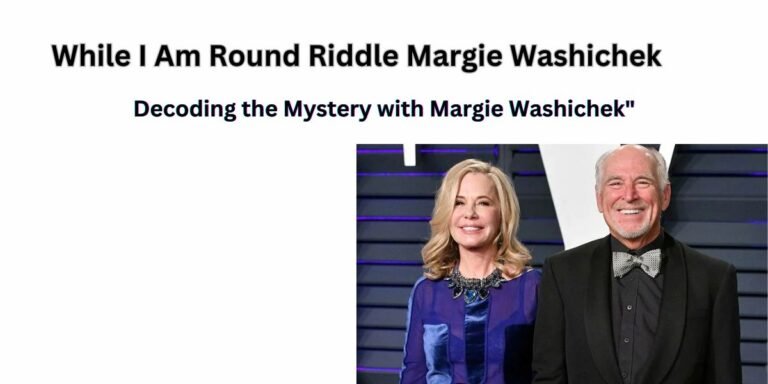Riddles have always captured the imagination of people across the world. From ancient civilizations to modern-day enthusiasts, riddles challenge our thinking, enhance problem-solving skills, and often entertain us with their cleverly concealed answers. One such riddle that has piqued the curiosity of many is the “While I Am Round Riddle,” which was popularized by Margie Washichek.
In this article, we’ll break down the riddle, examine its origins, explore its potential answers, and provide insights into why riddles like this one continue to captivate so many people. Whether you are a puzzle enthusiast or simply someone interested in the world of riddles, this guide will provide you with everything you need to know about the “While I Am Round Riddle” and its connection to Margie Washichek.
What is the “While I Am Round Riddle”?
The “While I Am Round Riddle” is a word puzzle that relies on clever wordplay and lateral thinking. In the riddle, the speaker describes an object or concept that is round in shape, but the clues that follow challenge the solver to think outside of the box. The key to solving this riddle lies in interpreting the phrase “round” in a broader sense, both literally and metaphorically.
The riddle goes as follows:
“While I am round, I hold things dear,
But when I am flat, I disappear.
What am I?”
At first glance, it seems simple enough — something round holds things dear, but when it flattens, it disappears. What could that be? The answer, when you think about it, is surprisingly straightforward but still requires some thinking.
Margie Washichek: The Creator Behind the Riddle
Margie Washichek is the mind behind the “While I Am Round Riddle.” A passionate lover of puzzles, Margie has created a variety of mind-bending riddles that have intrigued audiences over the years. While not as widely known as some other puzzle creators, Margie’s contributions to the world of riddles and wordplay are significant. Her works emphasize creativity and the ability to think abstractly, encouraging solvers to approach problems from new perspectives.
The “While I Am Round Riddle” stands out as one of Margie’s more famous creations due to its simplicity and the layers of meaning hidden within its words. The riddle plays with the concept of shapes and their metaphorical properties, providing both a literal and figurative interpretation.
Understanding the Riddle’s Clues
To solve any riddle, it’s essential to break down its clues and think about them in various ways. Let’s dissect the “While I Am Round Riddle” to understand its meaning.
“While I am round, I hold things dear”
The first part of the riddle describes something that is round. Many people might think of objects like balls, coins, or even the shape of the Earth. But the important phrase here is “hold things dear.” This suggests that the object in question has some kind of function related to storing, containing, or holding something important.
If we focus on the metaphor of “holding things dear,” we might also think about something that’s symbolic of keeping things safe or treasured.
“But when I am flat, I disappear”
The second part of the riddle introduces a contrast — the round object becomes flat, and when it does, it “disappears.” This is the trickiest part of the riddle, and it forces the solver to think about what could lose its significance or function when flattened. The idea of something disappearing when flattened suggests that it may no longer be able to serve its purpose or even cease to exist in the same way.
Solving the Riddle
Now that we have broken down the clues, let’s look for a potential solution.
The answer to the “While I Am Round Riddle” is a coin.
- A coin is round in shape.
- It holds things dear in the sense that it represents value, and people often treat their money with care.
- When a coin is flattened, either literally (for example, through compression or damage) or figuratively (in a symbolic sense), it loses its monetary value or function.
Thus, a coin fits both parts of the riddle perfectly. This answer ties together the concept of “round” and “dear” with the idea that a coin’s usefulness can disappear if it is altered or rendered useless.
The Appeal of Riddles Like the “While I Am Round Riddle”
Riddles like the “While I Am Round Riddle” are particularly appealing because they challenge both our logical reasoning and our creative thinking. The beauty of riddles is in their simplicity — they often rely on wordplay, double meanings, and lateral thinking to arrive at a solution that seems obvious in hindsight but is difficult to arrive at initially.
What makes the “While I Am Round Riddle” so enjoyable is the sense of accomplishment when the solution is finally revealed. Solvers are often left with an “aha!” moment, where everything clicks into place, and the answer feels like a perfect fit.
Additionally, this riddle encourages abstract thinking. It prompts solvers to think beyond the literal meaning of “round” and to consider other possible interpretations of the clues. In this case, the riddle blends literal and metaphorical elements, leading to a deeper understanding of how riddles work.
The Enduring Popularity of Word Riddles
While technology has advanced, and our means of entertainment have evolved, the popularity of word riddles remains strong. Why? Because they challenge our brains in ways that modern entertainment often does not. With many of today’s distractions, solving a puzzle provides a mental workout, honing cognitive skills like problem-solving, memory, and creativity.
Riddles are also social in nature. People love to share them with friends, family, and coworkers, testing each other’s ability to crack the code. The “While I Am Round Riddle” is an example of how a single puzzle can spark conversation and friendly debate. Riddles like this one are shared in schools, on social media platforms, and in everyday casual interactions.
Conclusion
The “While I Am Round Riddle” by Margie Washichek is a classic example of a simple yet effective puzzle that challenges our minds and provides a sense of satisfaction when solved. Through clever wordplay and lateral thinking, the riddle explores the concept of shapes and their symbolic meanings. With a straightforward yet elusive answer — a coin — it demonstrates the value of abstract thinking and the joy of problem-solving.
Whether you are a puzzle enthusiast or just someone looking for a fun mental exercise, riddles like this one remind us of the importance of curiosity and creative thinking. And in the case of the “While I Am Round Riddle,” the answer is right under our noses, proving that sometimes, the simplest answers are the most elusive until we take the time to consider all the clues.
FAQs
What is the answer to the “While I Am Round Riddle”?
The answer to the riddle is a coin. A coin is round and holds value, but when flattened, it loses its worth.
Who created the “While I Am Round Riddle”?
The riddle was created by Margie Washichek, a puzzle enthusiast known for crafting engaging word puzzles.
Why do riddles like the “While I Am Round Riddle” remain popular?
Riddles continue to be popular because they challenge our cognitive abilities and provide a sense of satisfaction when solved. They also encourage social interaction and creative thinking.
How can I improve my skills at solving riddles?
To improve at solving riddles, practice is key. Pay attention to wordplay, think outside the box, and don’t be afraid to approach problems from different angles. Regularly challenging yourself with puzzles will help sharpen your mind.
Where can I find more riddles like the “While I Am Round Riddle”?
You can find more riddles in books, online puzzle forums, and websites dedicated to brain teasers. There are also apps designed to provide daily riddles and puzzles to help you improve your problem-solving skills.

